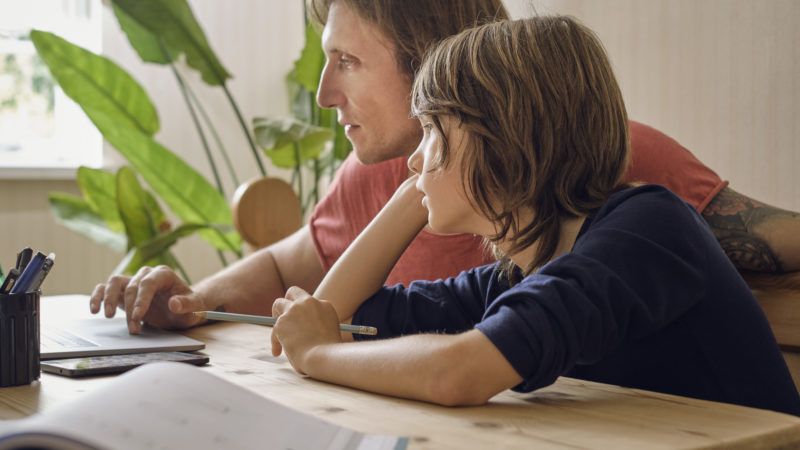Once Marginalized, Homeschooling Hits the Mainstream
DIY approaches to education—including homeschooling, learning pods, and microschools—are gaining popularity as public schools fold under pressure.

This week, Chicago Public Schools became the latest large school district to opt for online-only lessons in the fall. It's an attempt to minimize the threat of COVID-19 infection, but it leaves a lot of Chicago families unhappy and—like their counterparts around the country—heading for the exits, in search of options that better suit their needs now and in the future.
It's part of an education revolution poised to leave government schools just one option among many, as once-marginalized approaches such as microschools, teaching pods, and homeschooling become perfectly mainstream.
"Today, after carefully considering advice from public health experts and feedback from many of you, Chicago Public Schools (CPS) will begin the year learning at home through the end of the first quarter," CPS leaders announced August 5. "Prior to the beginning of the second quarter, we will assess the state of COVID-19 and the safety of switching to a hybrid learning model similar to what we proposed in our preliminary reopening framework."
Chicago isn't alone in this choice. Thirteen of the biggest government school districts in the country have opted for online-only approaches. Hawaii and New York City public schools propose a hybrid model.
There's certainly a constituency for online-only classes, although preferences vary. In July. Gallup found that 28 percent of parents favor online learning as schools reopen this fall, 36 percent want in-person school, and 36 percent prefer a hybrid model.
But people favoring any educational approach want it done well. And when Chicago Public Schools released data in May, even the best spin couldn't polish unpleasant facts.
"The percentage of students using Google learning tools for remote learning at least once a week has increased from 70 percent during the first week of remote learning (April 13 - April 17) to 77 percent during the week of May 11," it reported. That means roughly a quarter of students weren't showing up at all for online classes.
Plenty of public schools suffered similar challenges, leading the Wall Street Journal to conclude: "The results are in for remote learning: It didn't work."
That leaves even many families favoring online classes as dissatisfied as those preferring in-person learning—and not just in Chicago. Across the country, there has been a surge in interest in traditional alternatives such as private schools as well as homeschooling, microschools (which essentially reimagine one-room schools for the modern world), and learning pods (in which families pool kids and resources).
Homeschooling numbers are difficult to track, but North Carolina's website for families announcing plans to homeschool crashed at the beginning of July "due to an overwhelming submission of Notices of Intent." The site continues to experience high demand.
Homeschool filings in Nebraska were up 20 percent as of late July, and in Vermont they increased by about 75 percent over the same time in 2019.
The Texas Homeschool Coalition (THSC), which maintains an online withdrawal tool to help families notify their districts that they'll be homeschooling, reports that it "saw 15 times the number of public school families withdraw from public school through THSC's website to homeschool compared to the number of families who did so in July 2019."
Families that don't have the time or resources to educate their own kids are joining together to create learning pods, and microschools that spread costs, expertise, and responsibilities. Given that families often pool resources only for select subjects, and that wealthier families sometimes hire teachers for their learning pods, the lines are blurry among the various categories of DIY education. But why shouldn't they be blurry? Families aren't interested in imposing rigid models on their kids; they're trying to educate their children and adopting whatever tools and techniques get the job done.
In the past, that kind of experimentation was daunting to many families. Reinventing education is an unwelcome challenge to people already forced to pay taxes to support schools that, in many communities, seemed like safe if uninspiring institutions. Private schools require tuition on top of taxes, and homeschooling takes personal commitment to the process itself as well as to swimming upstream against cultural currents.
Even so, private schools before the pandemic enrolled about 10 percent of U.S. students, publicly funded but privately run charter schools enrolled about 6 percent of students, and homeschooling steadily grew to encompass at least 3.3 percent of students. Those percentages represent millions of families opting out of traditional public schools in good times.
Then came the pandemic, and a massive face-plant by the nation's government-run schools. Now, "23 percent of families who had children attending traditional public schools say they currently plan to send their children to another type of school when the lockdowns are over," according to some admittedly unscientific polling by the Reason Foundation's Corey A. DeAngelis. "Notably, 15 percent of respondents said they would choose to homeschool their children when schools reopen."
Families with kids in charter schools and private schools also plan some reshuffling—with homeschooling the likely big winner in all cases.
The data from states including Nebraska, North Carolina, Texas, and Vermont bear out what parents told DeAngelis: DIY education, in various forms, is enjoying a boom in popularity.
Other approaches are sure to emerge as people invent them to meet their needs. And some of the families now trying education alternatives will happily walk away when the crisis is over. They'll go back to what worked for them in the past. But they'll bring their experiences with them. DIY education won't be so strange to families who have done it themselves, and who have increased ranks of friends and neighbors still happily and enthusiastically engaged in homeschooling and its related variants.
Going forward, education is going to be a lot more diverse than in the past. And Americans are going to be much more comfortable with once-marginalized education options that are quickly becoming mainstream.


Show Comments (43)